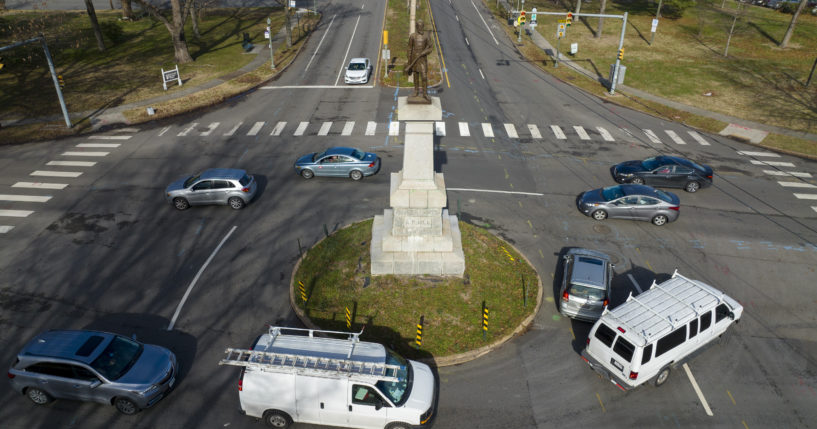
Descendants of Confederate General Get Devastating Ruling from Judge
Work to relocate Richmond’s final city-owned Confederate monument should start this week after a judge refused a request to delay the removal of the statue of Gen. A.P. Hill from its prominent spot in Virginia’s capital, an official said.
Richmond Circuit Court Judge David Eugene Cheek Sr. last week rejected a motion from four indirect descendants of Hill, who was killed in the final days of the Civil War, to stop the city’s removal plans.
Though the process of removing the monument from a busy intersection should start Monday, it’s unclear if it would be removed entirely by the end of the week, city deputy chief administrative officer Robert Steidel told WRIC-TV.
The city, one-time capital of the Confederacy, began removing its many other Confederate monuments more than two years ago amid the protests that followed George Floyd’s death. Among the notable monuments removed was an imposing statue of Gen. Stonewall Jackson, which was taken down from a concrete pedestal in 2020 along Richmond, Virginia’s famed Monument Avenue.
Richmond officials decided to convey the monuments to the Black History Museum and Cultural Center of Virginia. But efforts to remove the Hill statue have been complicated because the general’s remains were buried beneath the monument in 1891.
The indirect descendants and the city have agreed that Richmond’s plan to move Hill’s remains to a cemetery in Culpeper should be allowed to move forward. But these descendants contend they have control over the statue and want it relocated to Cedar Mountain Battlefield, near the cemetery, instead of to the museum. Cheek ruled against them in October.
In the most recent hearing, Cheek denied their motion to stay the removal of the Hill monument while the descendants press an appeal with the Virginia Court of Appeals.
The city has spent at least $1.8 million removing other city-owned monuments, the Richmond Times-Dispatch reported. Cheek determined that delaying the removal would result in additional costs and retain a potential traffic hazard.
The monument will be kept in storage while the case goes through the expected appeal process, Steidel said in court last week.
Many Confederate statues in Virginia were erected decades after the Civil War, during the Jim Crow era, when states imposed new segregation laws, and during the “Lost Cause” movement, when historians and others tried to depict the South’s rebellion as a fight to defend states’ rights, not slavery.
The Western Journal has reviewed this Associated Press story and may have altered it prior to publication to ensure that it meets our editorial standards.
Truth and Accuracy
We are committed to truth and accuracy in all of our journalism. Read our editorial standards.
Advertise with The Western Journal and reach millions of highly engaged readers, while supporting our work. Advertise Today.










